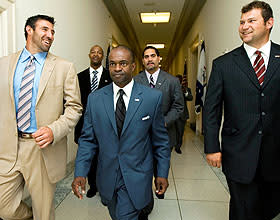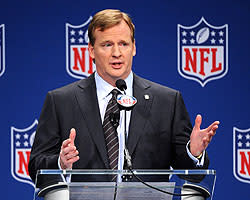Both sides bracing for uncapped season
As NFL players prepare for the battle their game entails, a second fight is being plotted against an interesting opponent: the same owners who send them out to play.
While the 2009 NFL season is set to begin with Thursday night's kickoff between the Tennessee Titans and Super Bowl champion Pittsburgh Steelers, there is a lurking labor dispute between players and owners over the collective bargaining agreement. The fight centers around how big a share of the financial pie players get (59 percent) and the expenditures that owners have made, particularly the flood of new stadiums that have been built in recent years with private funding.

DeMaurice Smith (center) with players Mike Vrabel(notes) (left) and Joe Thomas(notes) (right).
(Manuel Balce Ceneta/AP Photo)
Though outsiders tire of hearing about wealthy guys fighting with rich ones, the issue is not going away anytime soon. In fact, NFL Commissioner Roger Goodell suggested last week that the first step to labor unrest is all but guaranteed to happen next year when the league reaches the ominous "uncapped" year for the 2010 season. After that, owners are expected to attempt to lock out players, and legal battles will ensue. America's favorite game could go from being decided on the field to being argued in court.
In the meantime, both the players and the owners are making preparations. More than ever, players seem interested and motivated in heeding the advice of NFL Players Association executive director DeMaurice Smith. Among other things, Smith has advised players to save 25 percent of what they earn this year and next year to ready for the coming fight.
"We have to be ready for what the owners are going to do," said San Diego Chargers running back LaDainian Tomlinson(notes), who is entering his ninth season. "I've been telling all the guys in [the locker room], 'Be ready, save your money.' The owners aren't going to play around. They're going to lock us out; they're going to try to split the union; they're going to try to scare guys into taking a bad deal. We have to understand that."
For many players who are dealing with large amounts of money for the first time, the key is for them to say no to temptation to spend. Tomlinson's teammate Shawne Merriman(notes), who's dealing with a much more immediate problem right now, said that young guys have to be especially cautious.
"When you get that first check, you want things, lots of things," said Merriman, who owned six cars at one time. He said he's down to three and acknowledges even that's too much. "You get a few years into this and you realize you don't really need all that stuff. You don't even have time to drive all the cars and do that stuff if you're really working at your life.
"But that's what the owners want us to think, that we gotta have all this stuff. That makes us desperate and we can't be desperate."
Linebacker Karlos Dansby(notes), who has failed to reach a long-term contract with the Super Bowl runner-up Arizona Cardinals and has been franchised for two straight years, has made considerations beyond saving money.
"I'm thinking about going back to school, and I tell all the guys they should do the same," Dansby said. " 'What job skills do I have right now?' There's guys with degrees from Harvard who are out of work in this economy."
Other players talk about even bigger sacrifices, such as missing games or even a season, whatever it takes to make sure the union doesn't take a lesser deal.
"I'm one of those guys who believes you have to fight for the good of all the players and the guys in the future, not just yourself," Jacksonville Jaguars running back Maurice Jones-Drew(notes) said. "If some of us have to fight now to make sure we get a good deal for the future, that's the way it goes."
That collective awareness by players may be the key to a fight with the owners. Under the rules of an uncapped season, player movement would be drastically hindered. For instance, players would not become unrestricted free agents until after their sixth year. Playoff teams would be restricted by how many players they could sign.
"A lot of players, especially older guys in my situation, we could get hurt by this," said Denver Broncos wide receiver Brandon Stokley(notes), who is entering his 11th season. "But we can't go backwards. The guys who went before us, the guys who went on strike and went to court, they fought so that guys in the future could have it better.
"We can't let those guys down."
All of this comes in response to the owners' decision to opt out of the collective bargaining agreement in May 2008, a move that was seen by the late Gene Upshaw, the former head of the NFLPA, as a prelude to hard-line negotiations. Upshaw had negotiated the extension of the CBA in 2006 which resulted in the players getting 59 percent of the revenue, a figure that is the largest among the top professional sports in the United States.
In the three-plus years since that agreement, owners believe that the partnership got out of whack; that too much money is being guaranteed to players. The most significant issue for owners is that the need for new stadiums has forced them to dig into their own pockets for building and upkeep while the players have profited from the additional revenue. Combined with the impact on advertising and sponsorship caused by the downturn in the economy, owners have increasingly worried about how they can maintain an acceptable profit while paying players a growing share of the pie.
In fact, most teams are having trouble maximizing the cap. As a result, 15 of the NFL's 32 teams were at least $10 million under the salary cap as of last week, an unprecedented figure since the cap started in 1993.
Teams are so far under that many will be happy to see the uncapped year, even at the risk that the NFL could become like Major League Baseball, where big-market teams like New York and Boston regularly outspend the likes of Florida and Kansas City.
While the fear is that some teams may spend as much as they want, going beyond the current maximum of $128 million, a large number of teams also will be able to spend as little as they want, no longer having to spend to the minimum of $112.1 million.
In fact, three general managers recently agreed that a large group of teams could spend as little as $80 million on players in 2010, meaning that some owners will skim nearly $40 million off their payrolls for one season.
"No question that it could get that low if you really start to look around at some spending patterns and some of the contracts in place," said a general manager, who asked not to be identified because the NFL has repeatedly told owners and executives not to comment on the CBA negotiations. "Cincinnati, St. Louis, Tampa, Jacksonville, San Francisco, Kansas City, Miami … all those teams could sit there and play for cheap. No question. And really, they won't be much different than they are now."
Said another GM, who asked not to be identified: "The idea of the uncapped year is a lot more palatable now to teams than it ever was in the past. Most teams can't even spend enough on players to keep up with the cap. Nobody is in cap jail anymore, when you're forced to cut players."
More importantly, the consensus among team executives is that plenty of owners believe that they can simply pocket the savings they get in 2010 by playing for around $100 million or so. Then, the theory goes, the owners would simply renegotiate a new deal with the players that will again feature a salary cap for 2011 and beyond. And if there is a lockout in '11, owners will still receive money from the existing broadcast deals.
"The owners are going to make a point [in 2010] that they can get by paying a lot less and then they'll see how the players react," a team executive said.

Goodell took over in 2006, a few months after the CBA was last extended.
(Kirby Lee/US Presswire)
While Goodell spoke of the uncapped season last week, he also countered the notion that owners want to lock out players in 2011.
"The owners' intent here is to get to an agreement. The idea that the owners are looking for a lockout and that would be their objective is foolish," Goodell said. "That's really not a practical outcome for them in the sense of being beneficial to the league."
Goodell's comments were echoed by NFL executive vice president and lead in-house attorney Jeff Pash.
"There's a clear unity of purpose among the owners. There is no question about that," Pash said. "Now, does that mean that they are going to burn the village down to try to save it? No, as the commissioner said … Owners and presumably players recognize that there's a lot to be said for coming to an agreement that not only maintains but allows the business to grow, and that's where our head is.
"One thing I've heard a lot [from the players' side] is that, 'We haven't gotten a specific proposal.' And that's accurate in that we have not said, 'We want you to agree to this, this, this and this, and if you don't, all hell is going to break loose.' … One of the things we have tried to do in laying out the information … [has] been is to engage in some kind of collective joint problem-solving, if you will. The way people who are aligned in a common business would normally do and try to see if we can develop some solutions without people taking any hard-line positions and posturing and getting into rhetorical exchanges. I don't know if we're going to succeed in that or not. Maybe we do have to say A, B, C, D and E, and get into an argument about that."
While that may be the tack that the NFL is attempting in negotiations, the problem is that the NFLPA sees a strong fight by the owners in another area. The league and the union are currently awaiting a decision from the U.S. Eighth Circuit Court of Appeals regarding an attempt by the owners to ask the court to have Judge David Doty removed as the overseeing judge. In fact, the NFL has argued for no court oversight at all, even though court rulings in 1992 led to the current system and subsequent growth of the game.
In other words, the league is bringing a pen to one meeting and trying to wield a hammer in another. Of course, that's the nature of business, particularly when billions of dollars are being discussed.
Or as Dansby said: "When you fight about money, it gets ugly."
Sign up now for Fantasy Football '09 – now with free live scoring
